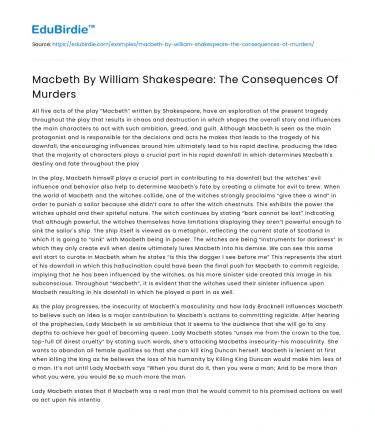All five acts of the play “Macbeth” written by Shakespeare, have an exploration of the present tragedy throughout the play that results in chaos and destruction in which shapes the overall story and influences the main characters to act with such ambition, greed, and guilt. Although Macbeth is seen as the main protagonist and is responsible for the decisions and acts he makes that leads to the tragedy of his downfall, the encouraging influences around him ultimately lead to his rapid decline, producing the idea that the majority of characters plays a crucial part in his rapid downfall in which determines Macbeth's destiny and fate throughout the play
In the play, Macbeth himself plays a crucial part in contributing to his downfall but the witches’ evil influence and behavior also help to determine Macbeth's fate by creating a climate for evil to brew. When the world of Macbeth and the witches collide, one of the witches strongly proclaims “give thee a wind” in order to punish a sailor because she didn’t care to offer the witch chestnuts. This exhibits the power the witches uphold and their spiteful nature. The witch continues by stating “bark cannot be lost” indicating that although powerful, the witches themselves have limitations displaying they aren’t powerful enough to sink the sailor's ship. The ship itself is viewed as a metaphor, reflecting the current state of Scotland in which it is going to “sink” with Macbeth being in power. The witches are being “instruments for darkness” in which they only create evil when desire ultimately lures Macbeth into his demise. We can see this same evil start to curate in Macbeth when he states “is this the dagger I see before me” This represents the start of his downfall in which this hallucination could have been the final push for Macbeth to commit regicide, implying that he has been influenced by the witches, as his more sinister side created this image in his subconscious. Throughout “Macbeth”, it is evident that the witches used their sinister influence upon Macbeth resulting in his downfall in which he played a part in as well.
Save your time!
We can take care of your essay
- Proper editing and formatting
- Free revision, title page, and bibliography
- Flexible prices and money-back guarantee
As the play progresses, the insecurity of Macbeth's masculinity and how lady Bracknell influences Macbeth to believe such an idea is a major contribution to Macbeth's actions to committing regicide. After hearing of the prophecies, Lady Macbeth is so ambitious that it seems to the audience that she will go to any depths to achieve her goal of becoming queen. Lady Macbeth states “unsex me from the crown to the toe, top-full Of direst cruelty” by stating such words, she’s attacking Macbeths insecurity-his masculinity. She wants to abandon all female qualities so that she can kill King Duncan herself. Macbeth is lenient at first when killing the king as he believes the loss of his humanity by Killing King Duncan would make him less of a man. It’s not until Lady Macbeth says “When you durst do it, then you were a man; And to be more than what you were, you would Be so much more the man.
Lady Macbeth states that if Macbeth was a real man that he would commit to his promised actions as well as act upon his intentions. Masculinity is a reoccurring factor within Macbeth which relates later on to his kingship and ultimately because of lady Macbeths influence and drive, she contributes to Macbeth's downward spiral.
Towards the end, fear becomes a crucial force within Macbeth as the others around him are undermining his position and kingship making Macbeth go to unmeasurable lengths to remain king. Macbeth starts to feel threatened by Malcolm as he presents a challenge to his aspirations as well as his kingship, Macbeth states “Stars, hide your fires; Let not light see my black and deep desires: The eye wink at the hand!” He summons darkness to conceal his thoughts and actions of murdering from heaven. Although Malcolm is not to blame, it is the witches who tell Macbeth to follow his “vaulting ambition” which causes him to kill Duncan starting the corruption of Macbeth and his rapid demise. Furthermore, Macbeth's insecurity comes back as he feels as if his kingship isn’t secure and could be taken away from him at any second. He starts to feel threatened by Banquo’s personality in which he fears that the witch's prophecies will come true and Banquo’s descendants will become king. Macbeth sees Banquo as “the torture of the mind” to resolve his apprehension, he hires the murderers to take out Banquo indicating the power that others have on Macbeth and which starts to contribute to his downfall. He feels as if he needs to take everyone out to have a secure kingship due to the everlasting fear inside of him. In the play the influence of others makes Macbeth feel threatened over his kingship in which deploys a non-stopping fear inside of him.
In the play, Macbeth, the power of Macbeth, and his actions show great consequences throughout. Through external forces, it is prominent that not only is Macbeth at fault for his downfall, but the other influences contribute to his demise. It is the influence, masculinity, and fear in Macbeth which causes him to spiral down as well as with the help of the other characters throughout the play.






 Stuck on your essay?
Stuck on your essay?

